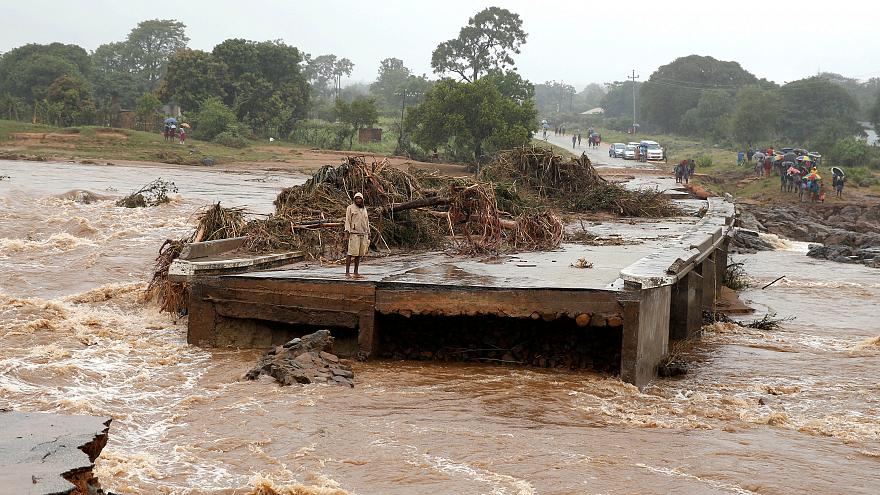
BY Everson Mushava/Tapiwa Zivira
Three women spent nearly 24 hours hanging onto a tree naked before they were eventually rescued after Cyclone Idai-induced floods swept away 80 houses at Dzingire Growth Point, popularly known as Kopa in Chipinge.
The houses were washed away when three rivers, Rusitu, Nyahode and Chipita flooded, confluenced and changed course, washing away all the houses and a police station situated between the rivers.
Several of the houses where owned by agricultural extension workers. Kopa possibly experienced most of the devastation.
One of the three women, Majiva Magweva (32), lost her two children to the floods as well as her mother. She also lost a niece and is now the only survivor in a family of three.
In a heart-rending account, Magweva said she hung onto her two-year-old child while she was being swept way by the floods, but was hit by debris and lost grip of the baby in the process.
“It was around 9pm on Friday when water started entering our house. I took my two-year-old child and went outside to look for a secure place,” Magweva said.
“I walked a few steps and was knocked down. I tried hard to keep a tight grip on my child, but was hit by a rock on the chest and forced to let off the child.”
- Chamisa under fire over US$120K donation
- Mavhunga puts DeMbare into Chibuku quarterfinals
- Pension funds bet on Cabora Bassa oilfields
- Councils defy govt fire tender directive
Keep Reading
She added: “I was thrown onto the river bank and I realised I was marooned and more water was coming. That time, I saw another woman. We rushed and helped each other up a tree, pushing and pulling each other. One more woman came and in no time, we were up three branches. We were all naked; we had been stripped naked by the floods.”
The women were forced to brave the rains for the whole night and tried to look for help after day break, which did not come until around 3pm.
“Around 3pm on Saturday, rescue came, but in a very difficult way. A group of men with three ropes, which did not reach us. One of them volunteered to have a rope tied around his waist and dived into the water while the other men held the rope to ensure that he does not drown. He arrived at the tree and went up, tied the rope on the branch to allow us to hold on it before they dragged him out using the same rope.
“When we were up the tree, we prayed the whole night for rescue. We wanted to join others, we didn’t know they had all been washed away. My two kids, my sister’s child and my mother are gone. I don’t know where they are,” she said, tears racing down her frail cheeks.
After the rescue, that is when Magweva realised hundreds of people had been washed away by the floods. What used to be their residential suburb is now littered with huge rocks, leaving no sign that it was a residential place.
“I am sure our relatives are trapped under these stones. Just there (pointing to a place littered by the rocks) was were our house was.”
Harryman Kazembe, a teacher, said his wife and daughter were woken by the sounds of the flood water at around 10pm and they attempted to move out of the area to higher ground.
“I briefly got stuck in the mud and my wife and children continued to go up. But suddenly, a wave of floods came and swept my wife and my five-year-old daughter away right in front of me. I was briefly swept away too and I had to hold onto a tree, where I was marooned for nearly 24 hours when local rescuers came with ropes and pulled me and others who had hung onto trees, to safety,” Kazembe said.
“One of my daughters, who survived, sustained burns on the neck after she got into contact with (live) electricity cables as she had taken refuge on poles that were carrying a transformer.”
As professional and State rescue took long to come, locals ended up taking matters into their hands because they could not continue to watch their fellow residents stuck up on trees as the water levels took long to subside.
It took five days for the first police and army trucks to reach Kopa and by that time, some who could have been rescued, had been swept away downstream.











